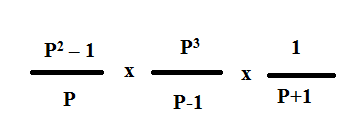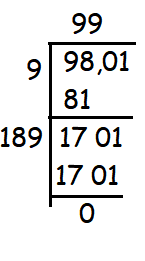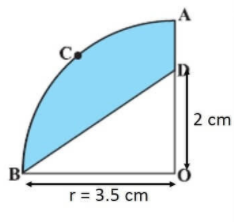GRADE 10 MATH QUESTIONS AND SOLUTIONS
Subscribe to our ▶️ YouTube channel 🔴 for the latest videos, updates, and tips.
Problem 1 :
Find greatest common factor of the following terms
20x3, 36x6
Solution :
20 = 22 ⋅ 5
36 = 22 ⋅ 32
Greatest common factor = 22 ⋅ 32 ⋅ 5
= 180
So, the greatest common factor is 180x6.
Problem 2 :
Simplify the following

Solution :
p2 - 1 = (p+1) (p-1)
= [(p+1) (p-1)/p]⋅ [p3/(p-1)] ⋅ [1/(p+1)]
= p2
Problem 3 :
Find the square root of 9801 by factor method.
Solution :

So, the square root of 9801 is 99.
Problem 4 :
Solve 6x2 + x - 1 = 0
Solution :
6x2 + x - 1 = 0
(3x - 1) (2x + 1) = 0
|
3x - 1 = 0 3x = 1 x = 1/3 |
2x + 1 = 0 2x = -1 x = -1/2 |
So the solution is {-1/2, 1/3}.
Problem 5 :
The product of two consecutive odd number is 323. Find them.
Solution :
Let x and x + 2 are two consecutive odd numbers.
Product of two consecutive odd numbers = 323
x (x + 2) = 323
x2 + 2x = 323
x2 + 2x - 323 = 0
(x - 17)(x + 19)
x = 17 and x = -19
So, the two odd numbers are 17 and 19.
Problem 6 :
Find two consecutive even integers whose product is 224.
Solution :
Let x and x + 2 are two consecutive even integers.
Product of even integers = 224
x(x + 2) = 224
x2 + 2x = 224
x2 + 2x - 224 = 0
(x + 16) (x - 14) = 0
x = -16 and x = 14
So, two consecutive even numbers are 14 and 16.
Problem 7 :
The length of the hall is 3 m more than its width. The numerical value of its area is equal to the numerical value of its perimeter. Find the length and width of the hall.
Solution :
Let x be the width of the hall
length = x + 3
Area of the hall = Perimeter of the hall
x(x+3) = 2(x+x+3)
x2 + 3x = 2(2x+3)
x2 + 3x - 4x - 6 = 0
x2 - 1x - 6 = 0
(x - 3)(x + 2) = 0
x = 3 and x = -2
x + 3 = 6
So, the width and length of the rectangle are 3 and 6 m.
Problem 8 :
Find the area of the sector of a circle with radius 4 cm and of angle 30°. Also, find the area of the corresponding major sector approximately (use π = 3.14).
Solution :
Area of major sector = πr2 - (θ/360)πr2
= π42 - (30/360)π42
= π42(1 - 1/12)
= π42(11/12)
= (176/12)(3.14)
= 46.05 cm2
Problem 9 :
OACB is a quadrant of a circle with center O and radius 3.5 cm. If OD = 2 cm, find the area of the shaded region.

Solution :
Area of shaded region = Area of quadrant - Area of triangle ODB
= πr2 - (1/2) ⋅ base ⋅ height
= (22/7)(3.5)2 - (1/2) ⋅ 3.5 ⋅ 2
= 38.5 - 3.5
= 35 cm2
Problem 10 :
The wheels of a car are of diameter 80 cm each. Find how many complete revolutions does each wheel make in 10 minutes when the car is traveling at a speed of 66 km per hour.
Solution :
Speed of the car = 66 km/hr
1000 m = 1 km
100 cm = 1 m
66 km = 6600000 cm
66 km/hr = 6600000/60
= 110000 cm/min
Distance covered = Time (Speed)
= 10(110000)
= 1100000
Radius of the wheel = 40 cm
Number of revolutions
= Distance covered / Distance covered by 4 wheels
Distance covered by 4 wheels = 2πr
= 1100000 / [2 (3.14) ⋅ 40]
= 1100000/251.2
= 4379
So, each wheel has to revolve 4379 times.
Subscribe to our ▶️ YouTube channel 🔴 for the latest videos, updates, and tips.
Kindly mail your feedback to v4formath@gmail.com
We always appreciate your feedback.
About Us | Contact Us | Privacy Policy
©All rights reserved. onlinemath4all.com

Recent Articles
-
Digital SAT Math Problems and Solutions (Part - 1)
Feb 05, 26 09:37 AM
Digital SAT Math Problems and Solutions (Part - 1) -
AP Precalculus Problems and Solutions
Feb 05, 26 06:41 AM
AP Precalculus Problems and Solutions -
SAT Math Preparation with Hard Questions
Feb 05, 26 05:30 AM
SAT Math Preparation with Hard Questions

